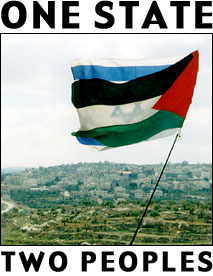
[but surely more than two]
At first I just wanted to post something about the latest horrors being visited upon Palestinians caught between the lines (the Green Line and the new Apartheid Wall line), but I didn't know where to begin - or end - such a story.
In the meantime I had found my way to the site of The Electronic Intifada, and I there I found my story. I suppose it's a cop-out in a way, because it avoids describing individual suffering in order to talk about how all the bad stuff might end. But maybe that's a good thing.
An articulate argument remarkable for its absence of rancor, blame or fury, advanced by Ali Abunimah, founder of the EI, outlines the case for the "one state" solution to the sufferings of Israelis and Palestinians alike. The article appeared on their website last week.
Abunimah begins by observing, ". . . it is inescapable now that what already exists is in effect one state: Israel, in which half the population -- the Palestinians -- have second-class rights or no rights at all, not even citizenship." While he apparently writes as a Palestinian, and directs his words primarily to Palestinans, I wasn't aware of any parochialism while I was reading. The words are for everyone, especially since the entire world is horribly impacted by this, yes, fundamentally parochial conflict. Remarkably, in the end the "one state" argument is also even more practical than idealistic.
It is the moment, therefore, for us to declare the era of partition over and commit to a moral, just and realisable vision in which Israelis and Palestinians build a future as partners in a single state which guarantees freedom, equality and cultural self-determination to all its citizens. Refusing to make this choice now means effectively agreeing to the endless bloodshed and extremism offered by Israel's political-military establishment and Hamas.Not part of the essay, but built on a truth understood by jews and arabs throughout the region, is the argument from demographics. The Palestinians will win the population race in the end, and an Israeli state defined by religion or race and controlled by a minority will have burdens which make today's look like small nuisances.. . . .
The burden to persuade Israelis lies largely with Palestinians, who while demanding equal rights and an end to the Jewish Israeli monopoly on power, must hold out a future in which the two communities express their identities as equals rooted by right and history in the same land.
This is undoubtedly an unfair burden, but it is a fact that oppressed groups must often show their oppressors a way out of the tunnel they have dug. This was true in South Africa, where even in the darkest days of apartheid, the African National Congress under Nelson Mandela offered white South Africans a future of reconciliation, not revenge. As in South Africa, a truth and reconciliation process can help both peoples overcome the pain of the past even as they build a just future together.
Israeli and Palestinian supporters of a one-state solution must build a new movement. This partnership must work to translate the vast international sympathy for the Palestinian cause into active support for the transformation -- with international assistance and guarantees -- of Israel and the Occupied Territories into a democracy for all its inhabitants. It must be a movement that builds political and moral power through non-violent resistance and civil disobedience, and mobilizes the widest possible base. Only through such a movement, I am convinced, shall we create peace in our lifetimes.
But it doesn't have to ahppen that way. The whole world could be an early winner if the "one state" approach described by Ali Abunimah were not absolute anathema for men with small minds and big clubs.
The particulars of the latest news from Israel/Palestine, especially as they might describe what is happening to Palestinians innocent of violence, are both too complex and too horrible to outline here, but they remain virtually unreported in the U.S. In the past I have used this space to give voices to dear and trusted friends who were in the Middle East, but it cannot really substitute for what is missing from the American media.
For that we all have to do our own searches. In addition to the website which produced the text I excerpted above, my friend and Middle East peace veteran Steve suggested several others when I asked where someone who was interested might get general summaries. I have listed them all below. Not surprisingly, and appropriately, they are not always of one voice.
The Electronic Intifada
Gush Shalom
B'TSELEM
Stop the Wall
UPDATE: For more on the few English-language websites which cover Palestinian issues specifically, go to this USC journalism site.
[image from The Electronic Intifada]